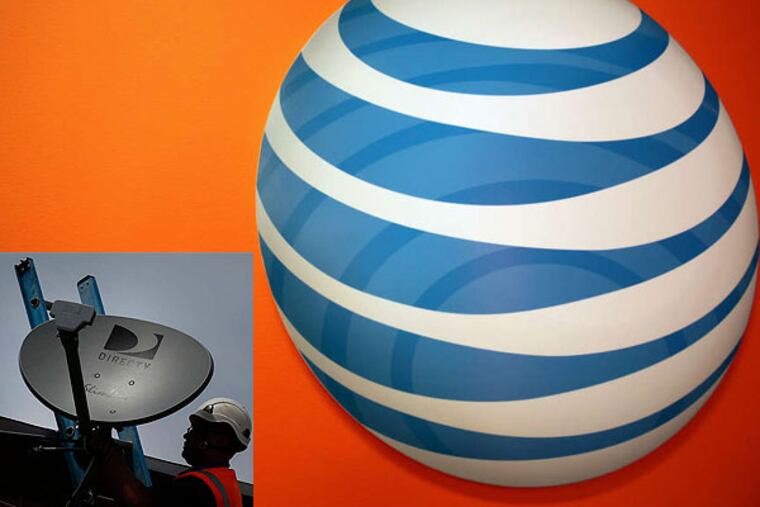What consumers can expect from AT&T, DirecTV deal
LOS ANGELES - Ready to bundle your mobile phone and TV bills together? That is one of the changes customers can expect if AT&T Inc.'s proposed $48.5 billion acquisition of DirecTV is approved by regulators.

LOS ANGELES - Ready to bundle your mobile phone and TV bills together? That is one of the changes customers can expect if AT&T Inc.'s proposed $48.5 billion acquisition of DirecTV is approved by regulators.
Here's a quick look at the consumer impact of the deal, based on information provided by the companies:
Question: How will my bill change?
Answer: For the time being, not at all. The deal is subject to government approval in both the United States and Latin America. Until the transaction is approved, the companies will operate separately. AT&T and DirecTV expect to close the deal within 12 months.
After that, however, the companies say a single bill for mobile phone, Internet service, and TV could be offered in certain areas.
Q: Will prices rise?
A: That is a concern when competition is eliminated. AT&T offers its U-verse video in 22 states, while DirecTV is offered nationwide. The overlap accounts for 25 percent of all U.S. households. Competition helps keep prices to consumers low. Just look at the deals that companies like Dish offer to steal you away from your current TV provider.
To mitigate the harm to consumers by reducing the number of TV competitors in many markets from four to three, the companies vowed to offer DirecTV on a stand-alone basis for at least three years at nationwide prices that won't rise or fall depending on local market conditions.
AT&T will also offer stand-alone Internet service for three years, so consumers who don't want to pay it for TV service can use video providers like Netflix or Hulu. DirecTV never offered Internet service, so prices won't be directly impacted by the takeover.
Q: Will there be consumer benefits?
A: AT&T says it will use cost savings - targeted at $1.6 billion a year - to introduce high-speed broadband to 15 million more homes, mostly in rural areas, within four years. That could improve speeds for people in areas with poor Internet connectivity, and, depending on where the rollout occurs, create competition for broadband in areas where consumers have few options.
The companies also say savings could be in the works for people who would want to combine DirecTV and AT&T wireless and Internet service. AT&T currently offers some plans that bundle DirecTV service. By deepening the partnership, the companies could offer more ways for customers to save through bundling.
Q: What does this mean for so-called net neutrality, the principle that Internet providers treat all traffic equally, regardless of the type of content?
A: Similar to Comcast's promise when it bought NBCUniversal, AT&T says it will abide by the Federal Communications Commission's 2010 open Internet order for three years, despite its having been struck down by a court. While the FCC is in the midst of changing those rules to allow for paid-priority fast lanes on the Internet with certain restrictions, sticking by the old order will effectively prevent AT&T from discriminating against Web traffic on its network for the time being.
Q: What new services will this allow?
A: Within a few years, AT&T says, consumers can expect to get more DirecTV content on their mobile devices, or even streamed into cars or airplanes.
The most tantalizing of these services would be NFL Sunday Ticket, DirecTV's exclusive offering that gives subscribers access to live NFL game broadcasts from around the country, no matter where you're based.